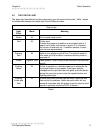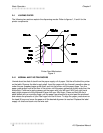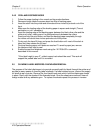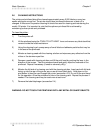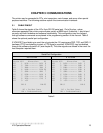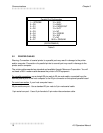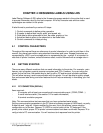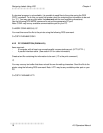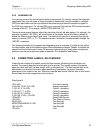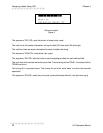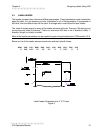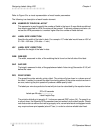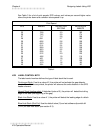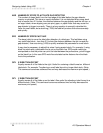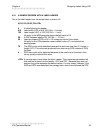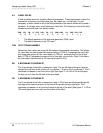Chapter 4 Designing Labels Using LDS
))))))))))))))))))))))))))))))))))))))))))))
))))))))))))))))))))))))))))))))))))))))))))
410 Operators Manual 19
4.2.3 LEARNING LDS
You can test some of the control code functions (see section 5.1) directly through the keyboard.
Large label files, such as some of those illustrated in Appendix B, may be entered in a straight
ASCII text word editor and then up-loaded to the printer using a terminal emulation program or
the DOS copy command. (To use the DOS copy command, first use the DOS mode instruction
to configure the PC. For example, MODE COM1:9600,N,8,1,P).
There are some special features offered by the printer that will aid label design. For example, the
auto-size command (^A2^D395) will provide most of the header format information needed to
define the different properties of label stock. The state of the machine is accessed through the
enquiry command (^D55 or ^E). The statistical printer information is made available through the
^A0^D295 command.
The following sections of this chapter are designed to give an overview of a label format, define
the label header, and list the different types of field information available. Chapter 5 explains the
special functions of the control codes. Once some understanding of these basic concepts are
achieved, use the quick reference guide in Appendix D for expedient label design.
4.3 FORMATTING LABELS: AN OVERVIEW
A label format consists of a header record and field records, followed by the text data to be
printed. The records describe how the label is to be printed. The header contains information
about the label itself such as label height, width, print speed, etc. The field records refer to the
data section and contain information about positioning coordinates, the type of character
generators or bar codes to use, etc.. Below is a sample label format. We will refer to this format
as we break down the components of its structure.
(See figure 5)
^D57<CR>
4,615,153,,20,30,,70,4<CR>
1,100, 40, 4, 1,4<CR>
2,100, 60,17, 1,4<CR>
3,100,100, 5, 1,6<CR>
3,100,150, 5,16,2,,,,30<CR>
^D56<CR>
^D2<CR>
EASY<CR>
MICROCOM MAKES IT<CR>
HELLO<CR>
^D3<CR>
A format is coming
Header information
Field #1 information
Field #2 information
Field #3 information
Field #4 information
Select RAM Format
Text Data is Coming
Text String #1
Text String #2
Text String #3
Print



